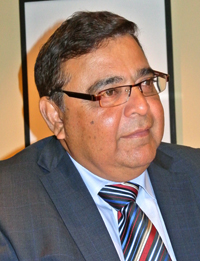Multiculturalism strength for country
A Canadian politician said multiculturalism is a strength for a country and the government should take a full advantage of it by welcoming differences.
“Everybody brings something to the table. In Canada, no matter what they are or who they are, they bring different views, ideas (which make people) think outside the box,” Deepak Obhrai, a member of Canada’s Parliament for Calgary East, said during an interview with The Korea Times, Saturday.
Obhrai was in Korea for a two-day visit.
His comment speaks volumes to Korean society that is labeled as a homogeneous one. However, the number of people with different ethnic backgrounds is on the rise, creating needs for increasing awareness and putting in place the right policies.
Having previously served as a critic for the Canadian government’s integration policies, Obhrai voiced opposition to the government placing barriers of any sort.
“It (Canada) used to have barriers. (For example,) they (the Canadian government) stopped people from coming in.” he said.
The politician himself is an immigrant.
Born in Tanzania, he studied in India and the United Kingdom. After immigrating to Canada in 1977, he worked for the city of Calgary, then left to run his own business. In 1977, he was first elected as a member of parliament, a post he’s been serving for almost 15 years. He speaks five different languages – English, Hindi, Punjabi, Swahili and Gujarati.
Obhrai now serves as the parliamentary secretary to the minister of foreign affairs, speaking on the Canadian government’s foreign policies to opposition members of the parliament.
The politician said violations of human rights in North Korea have been a concern for the Canadian government. Since 2005, Canada has provided $17.7 million in humanitarian assistance to people of the impoverished regime.
“We want to make sure that the response we do is collective,” he said. Since 2005, Canada stopped direct humanitarian assistance to the North, offering it only through an international organization like the World Food Program.
He called for a “positive change,” referring to regime change in North Korea, but said humanitarian assistance from Canada will continue regardless of the nature of the leadership.
“It’s the regime we are against. We’re not against the people of (North) Korea.” <The Korea Times/Kim Se-jeong>


























































